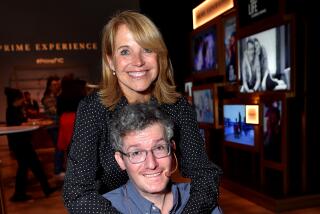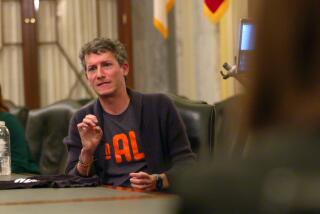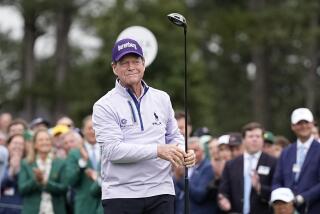Mixed Bag
- Share via
SONOMA, Calif. — He was hard to miss, but not because of the firetruck red shirt he wore or the snow-white sleeveless vest.
He was hard to miss because Bruce Edwards was the only caddie signing autographs Wednesday at every hole of Sonoma Golf Club in the pro-am round of the Charles Schwab Cup Championship.
Edwards successfully navigated an ocean of caps and visors and pairing sheets and photographs and T-shirts, signing each one. Then Edwards would pose for a quick snapshot as he sat in his golf cart.
And so he signed, he posed, he smiled and he chatted, though he wished he didn’t have to.
“I’d rather keep a lower profile, you know, sort of fly under the radar a little bit more,” he said. “But if being in the spotlight means I can make people aware of ALS, then it’s a good thing.”
Edwards, 48, has amyotrophic lateral sclerosis, or Lou Gehrig’s disease, and beginning today, he is working as Tom Watson’s caddie for what may be the last time in an official tournament. It has been a 30-year business arrangement between Watson and Edwards -- unprecedented in golf, which is not always known for lasting alliances.
As far as both parties are concerned, they’re still on for next year too.
“I’m planning on it,” Edwards said. “As long as I feel all right.”
On Wednesday afternoon, in the warm sunshine, Edwards felt all right, although he had lost about 20 pounds since January and was slurring his words.
“My speech is going,” he said. “And I feel it in my legs a little bit, not just at the end of the day, but generally overall.”
Watson says that when Edwards has trouble with his speech, he writes down the yardage numbers so that Watson can add them up himself. Edwards tries not to let his illness affect him on the course, but there are other troubling times.
“He breaks down,” Watson said. “He can’t communicate well. He wants to communicate and he can’t. It makes him understand his mortality. But we’re not going to be going there on the golf course.”
There is no obvious indication of Edwards’ illness. He has an official waiver to use a cart to carry Watson’s clubs, but carts used to be part of the regular scene on the over-50 tour, so they don’t stand out that much.
In the pro-am round, he pulled clubs for Watson and gave him distance, just as he has for three decades. Their familiarity and affection for each other was clear.
After Watson missed the fairway on the 18th hole and his second shot hit a tree, he turned and smiled broadly at Edwards, who grinned right back at Watson.
It has been an unusual experience for Watson, who has had strangers walk up and hand him money for ALS research. Through his own fund-raising efforts, Watson estimates more than $750,000 has been collected for the ALS Therapy Development Foundation in Cambridge, Mass.
There was never a question about getting involved. “It was a given,” he said. “I’m just trying to find something to help my buddy, my friend.”
The result is something inspiring, said Bruce Lietzke.
“My respect for Tom, the way he has handled the situation, has just doubled,” Lietzke said. “He’s not only affecting Bruce Edwards’ world, but all the people with ALS.
“We all love Bruce. He’s one of us. The way he’s hung in there, I’ll tell you, Tom Watson and Bruce Edwards have been the golf story of the year.”
Edwards and his wife, Marsha, found out what was wrong nine months ago. He even remembers the exact time. It was 2:30 p.m. on Jan. 15 and Edwards was at the Mayo Clinic in Rochester, Minn. The weather was cold and dismal, but maybe that should be expected, because it’s completely in keeping with the nature of ALS.
Amyotrophic lateral sclerosis is a progressive illness that damages the nerve cells in the spinal cord and brain. Eventually, those diagnosed with ALS lose the ability to control their muscles and as the disease progresses to its later stages, victims become paralyzed, even though their minds are unaffected.
The ALS Assn. reports that as many as 5,600 are diagnosed with the disease each year in the U.S. Some 30,000 in the U.S. and 70,000 worldwide have ALS.
Gehrig’s name was attached to the illness when he abruptly quit the New York Yankees in 1939. He was the first well-known person to have the disease, which also cut short the lives of Yankee pitcher Jim “Catfish” Hunter, actor David Niven, boxing great Ezzard Charles and New York Sen. Jacob Javits.
According to statistics, the average life expectancy of someone with Balbar ALS, the type that Edwards has, is as short as one year and as many as three years, beginning when they are diagnosed with the illness. Balbar ALS begins by attacking facial muscles, speech and swallowing.
For other types of ALS, the average life expectancy is from three to five years.
Medical statistics also indicate that 20% live five years or more, up to 10% survive more than 10 years and 5% live 20 years.
But the plain, cold, dismal facts are that death from ALS usually results from asphyxiation when paralysis attacks the diaphragm.
There is no cure. Watson’s answer was to become active in raising funds for ALS research. The cause of ALS is not completely understood and there is only one FDA-approved drug, Ritulek, to combat the illness by slowing its progression.
Watson took his place on what he calls his “bully pulpit” when he shot a first-round 65 at the U.S. Open with Edwards right beside him.
“It’s been great to use what I do for a living to help Bruce and all the other ALS people who have the problem,” Watson said. “It’s gratifying. But the bittersweet part is there is still nothing in front of us -- a cure or something that will help ALS patients. That’s the real negative of what we’re fighting for.
“We need more funds for research and that’s been my focus.”
There must be enough of Watson’s focus to extend to his golf game, which has been good enough this year to produce victories in two Champions Tour majors -- the Senior British Open and the Tradition. He was second in two others.
His 68.91 scoring average leads the Champions Tour and so does his prize money of $1.599 million.
But Lietzke isn’t sure Watson’s golf is equal to his status as a fund-raiser for ALS and the role of making the public aware of the disease. Watson and former USGA president Sandy Tatum are behind a pro-am tournament Nov. 3 at Stanford to raise money for the Robert Packard Center for ALS Research.
“I mean, here’s a guy who has a psychology degree from Stanford,” Lietzke said. “He’s got a grip on himself and life.”
As for Edwards, he is trying to keep his own grip. When he and Watson attended a banquet at the Masters, they sat at a table just in front of the dais, where golfer Jeff Julian accepted an award. Julian has ALS and was unable to speak. He punched responses into a hand-held machine that mechanically reproduced words.
That was in April. Only 14 months earlier, Julian had played the AT&T; Pebble Beach National Pro-Am.
At the U.S. Open in June when he caddied for Watson, Edwards’ voice had deteriorated and he was slurring his words. But there was no misunderstanding his message.
“People say you can’t will it away,” he said as he stood beside the clubhouse at Olympia Fields Country Club. “I think you can. It’s pretty simple. You can decide you want to feel sorry for yourself or you can decide to live every day. I’m going to keep on going.”
That’s probably what Mark Burrow and Darren McBratney were thinking when they drove a golf cart from Kansas City to Pebble Beach to raise money for the ALS Therapy Development Foundation.
Their trip covered 2,037 miles in 13 days and raised $75,000. Burrow and McBratney left from Iron Horse Golf club.
“Because Lou Gehrig was called the Iron Horse,” said Burrow, who walked alongside Edwards during Wednesday’s pro-am and met with Watson for a moment afterward. Burrow and McBratney wore caddies’ bibs with the name “Edwards” on the back.
“Thanks for the opportunity to be here and say a little more about ALS,” Burrow said.
By the time Watson was through with his last round of interviews, Edwards had left Sonoma Golf Club. Watson says he is making plans for next year and having Edwards on his bag. He already knows what Edwards is going to say.
“ ‘Let’s go make birdies,’ ” Watson said. “That’s the way he wants to live the rest of his life.”
More to Read
Go beyond the scoreboard
Get the latest on L.A.'s teams in the daily Sports Report newsletter.
You may occasionally receive promotional content from the Los Angeles Times.










